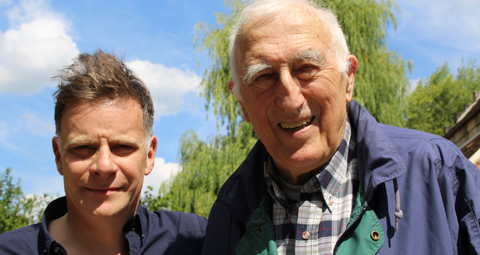May 10 | ![]() 0 COMMENTS
0 COMMENTS ![]() print
print

Jean Vanier’s revolutionary community of togetherness
Ricky Ross interviewed Jean Vanier in 2016. It is republished here on the L’Arche founder’s death
Jean Vanier was a Canadian Catholic philosopher, theologian and Templeton Prize Laureate. Founder of L’Arche, an international network of communities for people with and without learning disabilities, St John Paul II said he was a ‘great voice for the culture of solidarity and the civilisation of love, both in the fields of thought and action, in his commitment to encouraging the integral development of every man and the whole man.’
Radio Scotland broadcaster Ricky Ross travelled to France in 2016 where Jean Vanier lived in the original L’Arche community to interview him for his radio show.
In the peaceful, rural surroundings of the L’Arche community at Trosly-Breuil around 100km north of Paris, Jean Vanier met Mr Ross (right) with a notable absence of PR guardians or fluttering attendants. Here, we reprint the interview in full.
Q: You say in your book that humiliation is the worst thing that happens to human beings. Can you unpack that for us? People might be surprised at that.
A: I can tell you about somebody we welcomed here, Pauline. She arrived in 1973, age 40.
She was hemiplegic, epileptic, had one arm paralysed and one leg paralysed. But what was striking with her was, she was furious, enraged. And it’s not easy the way we live; we live in little houses and it’s not easy to live with somebody who’s enraged and yelling.
She wouldn’t hit anyone because she’d fall down with her paralysed leg. But our psychiatrist said she has been humiliated for 40 years: looked down upon. Her parents didn’t want her like that. She went to school and they laughed. In the streets she was mocked because of her leg, so she began to hate her body.
So there was a sort of anger. And our psychiatrist said either she could fall into a deep depression and a concealed anger, or else let it come out. Because people have treated her as being of no value, you’re no good, you’re mentally deficient, you’re an idiot.
But in her is her person crying out, and our psychiatrist said, you know what she’s crying out for: friendship. To become a friend.
She had good doctors, she had all sorts of professional people. But nobody who said, I want to live with you. And that if you like is the heart of L’Arche: I’m happy to live with you. It’s good to be together.
Q: Why do you not despair? Down the road there, not far from us here, is a place in Calais which people have described as a living hell for people. And people are trapped in that kind of cyclical movement of humanity which they can’t extricate themselves from. Why do we not despair? Why do you not despair? What gives you hope?
A: To despair is just sinking into the same thing. The big thing is what can I do, what can you do, what all of us can do—not very much. We can do something little.
And what I can do—I’ve been in this community now over 50 years—is to help people with disabilities who are one of the groups that are pushed away, to reveal to them that they are beautiful.
And then when people come to live with them, people come thinking they’re going to do good to the poor, but then they discover that Pauline—what she needs is not somebody doing things for her, but living with her, and saying I’m happy to live with you.
That’s what changes—it’s a revolution. And so, I can’t do very much, but I can live in a community. I can even, now that I’m 87, I can be a sign that it’s good to live with people, and I have my home here, and I eat every day, not for breakfast but for lunch and dinner, we eat together, have fun together, laugh together and this is what it is.
All I can do is help a few people. What we like to say in L’Arche is, we can change the world one heart at a time.
Q: We’ve talked about faith, but what we haven’t really talked about is times when doctrine and faith have been seen by people within the Church and outside the Church to be a handicap, to be a real burden for progress. And I’m thinking about how we’ve dealt with people who have had AIDS for example in Africa.
Do you feel confident that the Church as a whole—and I know that you’ve been one of the lay people who have advised at the Vatican and so on—do you feel the Church is listening, is opening itself up to the poor, to people who are really suffering? Sometimes doctrine has been seen, at least from the outside, to be a hindrance to their progress.
A: Well what I see is, on one side [Pope] Francis, and the other [Anglican Archbishop] Justin Welby. I mean these are two men who are open, loving, trying to break down the all-powerful law which, if you’re carried and motivated by law, then you don’t stop.
You want to change people, but you don’t listen. Tell me your story. And to hear the story of people; hear the story of people with homosexuality, what they’ve lived.
Hear the story of people who have been divorced. Hear the story, and then something happens.
That’s about compassion, understanding. Maybe they can’t fit yet well into the structures of the Church.
But that doesn’t matter. I want to be with you, I want to accompany you, I want to be your friend, and then we will see how things will move on.
So law is necessary, and even more is listening and understanding and mercy and being open to people. Open to their story, and listen to their story. We’re not there to change people, we’re there to help them discover how beautiful they are and then to take the journey they feel they should take.










